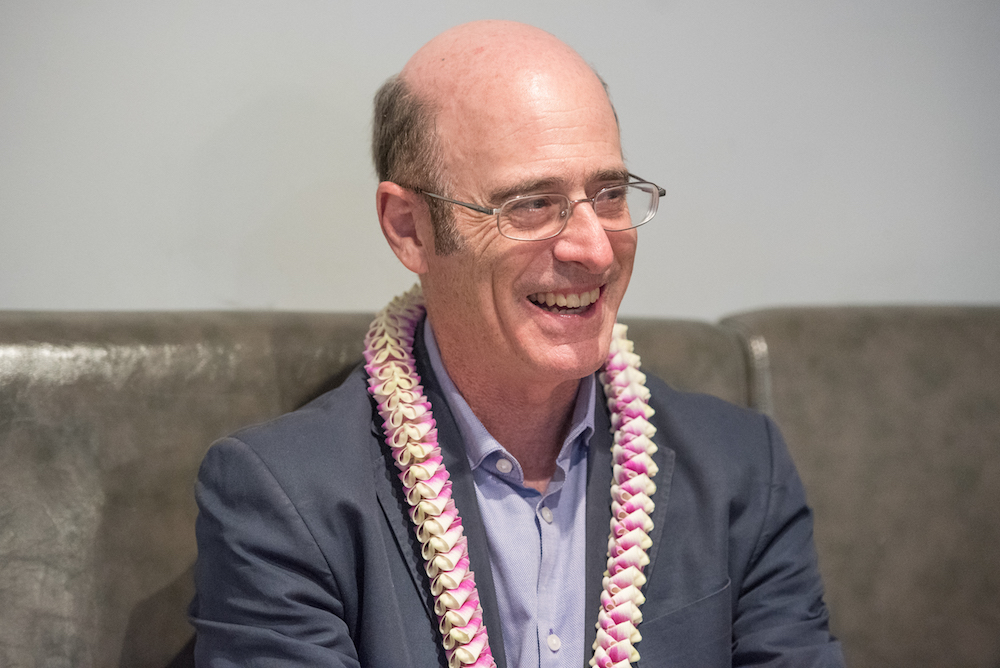
Photo by Joseph Esser.
Robert Lempert is a RAND Corporation scientist and a contributor to the Nobel Peace Prize-winning United Nations’ Intergovernmental Panel on Climate Change. Before taking part in a Zócalo/Daniel K. Inouye Institute “Pau Hana” event titled “What Can Hawai‘i Teach the World About Climate Change?” at Artistry Honolulu, he chatted in the green room about Alaskan bookstores, getting back to playing piano, and what he tells people they can do about climate change.
What’s some of the best advice you ever got?
Trust yourself. Stick with things. Have good mentors.
Is there a place in nature where you go periodically to check in with yourself?
I work in Santa Monica, California, but we live in the hills a little north of there, so we’re right next to Will Rogers Park, and our house looks out over the Pacific and the Santa Monica Mountains.
So you don’t even need to leave your house!
We don’t need to leave our house! Or we can just walk up the hill and go off into the Santa Monica Mountains. We don’t go to Hawai‘i that often, but I just love the water here. I don’t do much swimming in L.A. because the water’s too cold, but here the water is just the perfect temperature. But the main one is just going up the hills behind our house.
What are you reading now for pleasure?
I’m reading UCLA professor Adam Winkler’s book on how extensively the Supreme Court over the last 250 years has promoted corporations as having rights. I can’t say I’m enjoying it, because it makes me mad! [Laughs] But it’s really interesting. And we just got a big grant to do landslide risk-management in Sitka, Alaska, which is the old capital of Russian America. It’s a beautiful little town in the southeast part of the state. So I was up there, and I found in an adorable little bookstore a book called Empire of Extinction, and it’s about how the interaction of the Russians and the indigenous peoples in the North Pacific—in an area just teeming with sea life, in these very cold waters—drove the sea otter nearly to extinction. And they drove a thing called the Steller’s sea cow to extinction. I’m not sure it’s a super-pleasurable book, but it’s really interesting.
Was there a teacher or professor who really influenced you?
I had a fabulous high school math teacher who just really crystallized my interest in science and math. I grew up in the Bay Area, and one of his other students went on and was the founder of one of the Silicon Valley giants. When they asked him ‘Who’s your influence?’ he said, ‘Lloyd Walker.’ That was my teacher. Then I had some fabulous teachers in college. I had an absolutely amazing physics teacher who pushed you hard but was so exuberant—Mel Schwartz. And a variety of others. In college, I double-majored in physics and political science, which has shaped a lot of my career as someone who’s interested in the intersection of policy and science—which climate change is one of the biggies. So I also had a really fabulous political theory professor, Nan Keohane at Stanford.
If you could time-travel, where would you go?
It’d be really fun to see what the world’s like in 100 years. That would be wild. It’d be fun to see ancient Rome. I remember when I did my first college-student tour of Europe, I went to Rome and I was looking through a guidebook, and it had never occurred to me that Rome had only reached the size it had had in antiquity toward the end of the 19th century. I had this totally naïve, 20-year-old’s idea of progress, where things always go in one direction. So the notion that this gigantic city would’ve been gigantic in antiquity, and then have only 10,000 people in it for many centuries afterward [was strange].
Do you play a musical instrument?
I used to play piano a lot, mostly classical. I wasn’t playing frequently enough that I started sounding sufficiently bad, so I stopped. Hopefully I’ll pick it up again.
What else do you do to chill out?
Read, watch sports, cook a lot. We take walks, do our hikes. I ride my bike to work most days, which is really nice. It’s about 25 minutes in and 45 minutes home depending on how much wind is blowing.
When people find out that you know a lot about climate change, what question do you get asked most about the future and what we can do about it?
People often want to know what they can do about climate change.
And what do you tell them?
Vote. There’s lots of things you can do, but in some ways that’s the most important.



